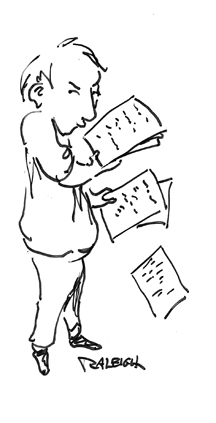Film: Script Writing and Another Chance at the Big Money
By Henry P. Raleigh
ART TIMES Sept/ Oct 2011
 |
Ever alert to increasing my knowledge of filmmaking and its practices I have begun an intensive investigation into the art of film writing. I confess I am encouraged in this scholarly pursuit by learning that Amazon.com has created Amazon Studio, an organization that will receive original film scripts and award generous cash prizes to the best of a month’s submissions and best of the year. And — get this — the grand winner’s script could be produced by Warner Studios. The terms and conditions are a bit complicated, all described in their internet site for anyone interested — and boy, will there be plenty interested.
Now script writing is tricky business, I can tell you. Schools devote entire writing programs to this craft. Although my own education in the higher reaches of aesthetics included nothing of this sort of activity I figured I could easily develop these skills by a study of the real, professional goods. Luckily film scripts are not hard to come by and the one that proved of greatest value is the first and only script written by the notable filmmaker, Stanley Kubrick. Here is a script to learn from, all right. Well, rather to learn what not to do for the film was never produced — and no wonder. Not since Abel Gance and his 1927 “Napoleon”, a four and a half hour epic, had anyone tried to cram nearly every minute of fifty-one years of Mr. Bonaparte’s life into a film. Even spreading his hero’s adventures over three screens Mr. Gance could only get him up to the invasion of Italy. Mr. Kubrick, in an hour’s less time, moved him right through the burning of Moscow and maybe Waterloo and after but by then my brain was so overburdened by historic facts that tumbled willy-nilly over a story unfolding in machine gun rapidity, that I abandoned the script in exhaustion.
Equally impressive, not to say intimidating, is an addendum to Mr. Kubrick’s “Napoleon” script in which he lists, in mind-boggling detail, a complete preliminary planning for this prospective film. Starting with a precise number of shooting days (150), dates for the shoot (July 1 to September 1, 1969); on to the cost of 30,000 soldiers to stock battle scenes (Rumania offered $12 per day, per man, Yugoslavia $15); extras in costume (authentic looking $2 to $5 a set) $19.20 if hired in England, from Spain $14.28, Italy $24 and France $24.30 — nothing is overlooked by Mr. Kubrick and it’s a shame we’ll never get to see the film after all the work he put into it.
Now my own film (I will not name its title so unfairly maligned) it has been in previous mentions, has little in way of a script, a mere handful of notes, actually. Here Mr. Kubrick and I are quite different. I feel a truly unique, creative work of filmic art can only suffer from excessive planning and maybe that’s what happened to Mr. Kubrick. And in any case you really only need a script if your actors are to have speaking parts, right? My nameless film has no speaking parts – less is more, as someone once said, although one of the principals did bark but this did not detract one bit from the work’s dramatic intensity. I have found myself that it is the dialogue end of film writing that gets you into trouble, so it’s best, I think, to avoid it whenever you can. Mr. Kubrick was somewhat weak in this respect and unless his characters were shouting “charge” or “Damn, it’s cold in Russia”, their speaking parts ran to the banal or worse.
Amazon Studios does set a seventy-minute minimum length running time for competition entries. Since we script writers figure a page of written script is approximately equal to one minute of film time I need but throw in sixty pages or so to flesh out my notes to knock out a completed script to meet Amazon’s requirements. This should prove no problem; it’s simply a matter of stretching things out and using extra wide margins. Once you get into this script stuff it’s easy enough it seems to me and I don’t see why Mr. Kubrick had to take on all his research and labor over 157 pages and where did it get him? Amazon Studio would, in a pinch, consider a finished film but this seems unnecessary when Warner would do the whole thing for me and it wouldn’t take up too much of their time, either. Needless to say I would certainly tell them the title of my film.
